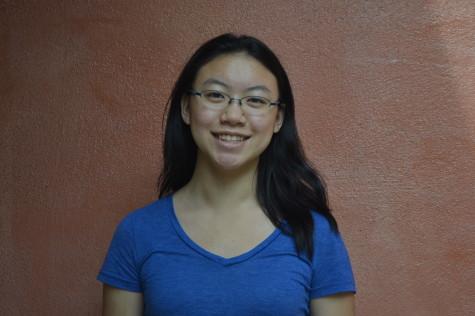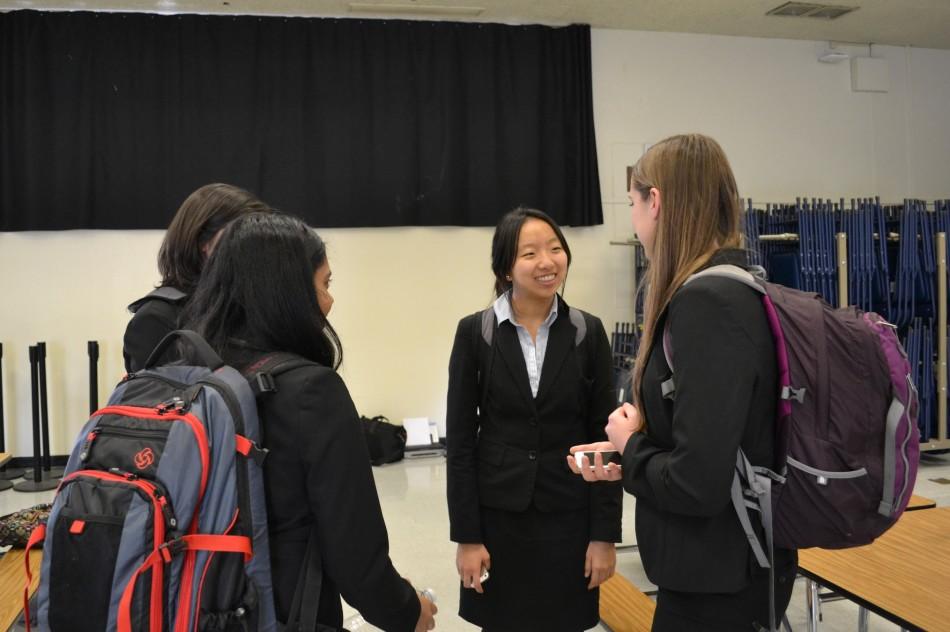Public forum teams debate in state qualifier on the issue of single gender classrooms
Upper School debaters discuss their arguments after five rounds of alternating stances on the issue of having single gender classrooms for public schools. The state-qualifying tournament for public forum was held yesterday and today at Leland High School.
Three Upper School teams debated today in the public forum state qualifier at Leland High School, arguing both sides of the issue concerning whether single gender classrooms would improve the quality of American public education.
The tournament consisted of five rounds, two of which were yesterday and three today. The teams’ stance on the issue alternated for each round.
The team of Arjun Kumar (12) and Adithram Rengaramchandran (12) pointed out the flaws in studies conducted on the success of single gender classrooms as one of its arguments.
“In the United States, for instance, it’s very hard to do a truly randomized study about single-gender schooling because researchers […] can’t force somebody to go to a school,” Arjun said. “A lot of times what we do is we talk about how our opponents’ studies don’t actually properly account for these variables because right now a lot of single-gender schools are private schools so necessarily that comes with a lot of things like socioeconomic status, higher levels of education, and a higher testing level to get in.”
For one of its arguments supporting single gender classrooms, the team of Samali Sahoo (10) and Zoe Papakipos (12) took the angle of gender stereotypes faced by girls in some co-educational classrooms.
“If you’re stereotyped, then you have less STEM [science, technology, engineering and mathematics] opportunities, or if there’s less stereotyping, then later on you’ll be more open to STEM fields,” Samali said.
Personally, Zoe agrees with this perspective but has not experienced it firsthand.
“It limits the attitudes towards STEM,” she said. “It’s not very prevalent at Harker, like I’ve never felt discriminated against in STEM classes.”
The teams prepared for this debate by gathering evidence and research over the course of a week. Debaters could choose to share their information with other Upper School teams through a joint Dropbox. They also held practice rounds in class over the past week.
For some seniors, this tournament would be their last.
“I’m happy it’s the last debate tournament of my life. I’m very happy to have an amazing partner,” Adithram said.
The top five teams in this tournament move on to the state competition. No Upper School team will participate in the state round.

Kacey Fang (12) is the Managing Editor for The Winged Post. She has been part of the journalism program since freshman year and served as Features Editor...




![LALC Vice President of External Affairs Raeanne Li (11) explains the International Phonetic Alphabet to attendees. "We decided to have more fun topics this year instead of just talking about the same things every year so our older members can also [enjoy],” Raeanne said.](https://harkeraquila.com/wp-content/uploads/2025/10/DSC_4627-1200x795.jpg)


















![“[Building nerf blasters] became this outlet of creativity for me that hasn't been matched by anything else. The process [of] making a build complete to your desire is such a painstakingly difficult process, but I've had to learn from [the skills needed from] soldering to proper painting. There's so many different options for everything, if you think about it, it exists. The best part is [that] if it doesn't exist, you can build it yourself," Ishaan Parate said.](https://harkeraquila.com/wp-content/uploads/2022/08/DSC_8149-900x604.jpg)




![“When I came into high school, I was ready to be a follower. But DECA was a game changer for me. It helped me overcome my fear of public speaking, and it's played such a major role in who I've become today. To be able to successfully lead a chapter of 150 students, an officer team and be one of the upperclassmen I once really admired is something I'm [really] proud of,” Anvitha Tummala ('21) said.](https://harkeraquila.com/wp-content/uploads/2021/07/Screen-Shot-2021-07-25-at-9.50.05-AM-900x594.png)







![“I think getting up in the morning and having a sense of purpose [is exciting]. I think without a certain amount of drive, life is kind of obsolete and mundane, and I think having that every single day is what makes each day unique and kind of makes life exciting,” Neymika Jain (12) said.](https://harkeraquila.com/wp-content/uploads/2017/06/Screen-Shot-2017-06-03-at-4.54.16-PM.png)








![“My slogan is ‘slow feet, don’t eat, and I’m hungry.’ You need to run fast to get where you are–you aren't going to get those championships if you aren't fast,” Angel Cervantes (12) said. “I want to do well in school on my tests and in track and win championships for my team. I live by that, [and] I can do that anywhere: in the classroom or on the field.”](https://harkeraquila.com/wp-content/uploads/2018/06/DSC5146-900x601.jpg)
![“[Volleyball has] taught me how to fall correctly, and another thing it taught is that you don’t have to be the best at something to be good at it. If you just hit the ball in a smart way, then it still scores points and you’re good at it. You could be a background player and still make a much bigger impact on the team than you would think,” Anya Gert (’20) said.](https://harkeraquila.com/wp-content/uploads/2020/06/AnnaGert_JinTuan_HoHPhotoEdited-600x900.jpeg)

![“I'm not nearly there yet, but [my confidence has] definitely been getting better since I was pretty shy and timid coming into Harker my freshman year. I know that there's a lot of people that are really confident in what they do, and I really admire them. Everyone's so driven and that has really pushed me to kind of try to find my own place in high school and be more confident,” Alyssa Huang (’20) said.](https://harkeraquila.com/wp-content/uploads/2020/06/AlyssaHuang_EmilyChen_HoHPhoto-900x749.jpeg)



